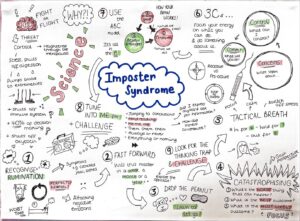Do you struggle with imposter syndrome? Research has indicated that a huge 70% of people have experienced imposter syndrome at work and it suggests factors like gender and race can increase the likelihood of experiencing imposter syndrome, with women and people of colour at greater risk as they are more likely to be underrepresented.
This means that women working STEM roles, particularly women of colour, could be highly at-risk for experiencing imposter syndrome.
What is Imposter Syndrome?
Imposter Syndrome is characterised by difficulty with internalising one’s own accomplishments, competencies and achievements, instead attributing success to other factors. Imposter Syndrome is widespread, but there are multiple reasons why women and other marginalised groups working in STEM contexts are more likely to experience this harmful phenomenon.
Recent research suggests that to fully understand individuals’ feelings, we must consider the quality of treatment people receive from others. In other words, people are more likely to feel like imposters when they are regularly treated in ways that suggest they are. This is why it is imperative that we create inclusive STEM work environments. Consider how work-based micro-aggressions can undermine a person’s sense of worth or recognition, over time. In addition, many women report that the symptoms of menopause can trigger or exacerbate Imposter Syndrome.
The Science Behind Imposter Syndrome
To combat the iron grip that these feelings have on so many objectively talented and successful women in STEM, WISE hosted a practical member webinar: ‘How to Overcome Imposter Syndrome for Professional Growth’.
Our fantastic expert speaker, Louise Scambler, outlined her unique approach to combatting imposter syndrome. It focused on 8 simple, practical tips, which can all be easily practiced and developed. They might not cure issues overnight, but they will provide a stack of coping mechanisms and techniques to help build our resilience and help us to counteract negative self-talk.
Louise began by explaining what physically happens to our bodies when we ruminate on the “bad feelings” associated with Imposter Syndrome – fear, anxiety, shame. For a start, rumination releases Cortisol, our stress chemical, into our blood. By activating our evolutionary “flight or fight” response, this in turn shuts down 40% of the decision-making part of the brain. In turn, this means that we are less able to think clearly or creatively. In this way, Imposter Syndrome can limit our work capacity and performance. Learning to recognise this negative pattern of rumination, is the first step to overcoming it.

Members can now watch and share the recording from the full event by visiting the Member Dashboard and clicking on Past Events.
The popularity of this event showcased how important this barrier is, for the ongoing progress, retention, and wellbeing of women in STEM careers. Consider sharing this webinar with other colleagues at your work or using it as part of an internal training event.
Tactical Breathing
When rumination does hit, try this simple Tactical Breathing technique to intercept the rumination spiral, and change how you are feeling physically and emotionally.
Practice by following the steps below:
Step one: breathe in for 4 seconds
Step two: hold for 7 seconds
Step three: breathe out for 8 seconds

To learn about the other 6 steps that Louise covered, members can now watch and share the recording from the full event by visiting the Member Dashboard and clicking on Past Events.
Louise Scambler is co-founder of The Resilience Development Company, an evidence-based training provider that helps organisations to reduce stress and improve performance. You can learn more about her work by visiting Louise’s LinkedIn page here.
